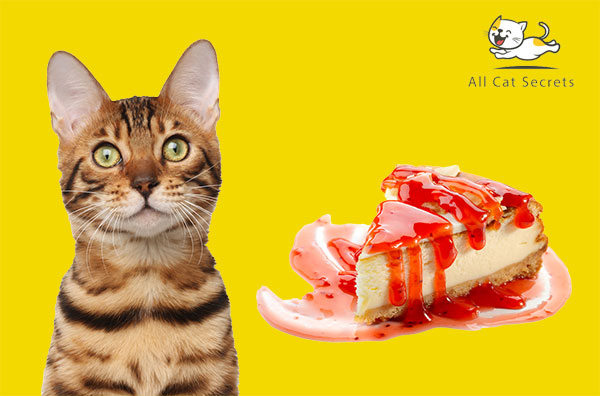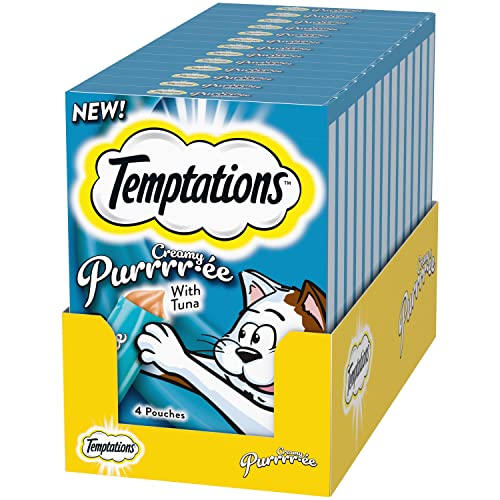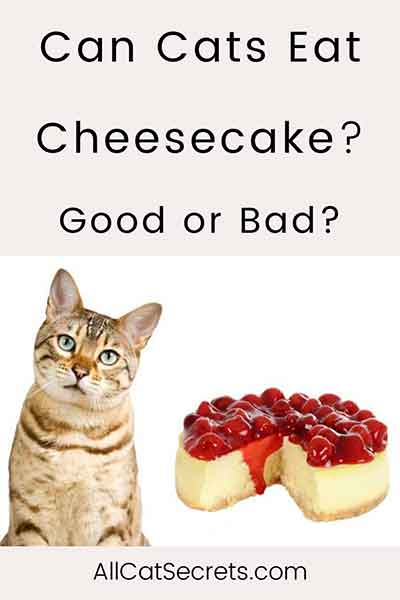If you love cheesecakes and are also a proud cat owner, you’ll notice that your feline friend gets all anxious whenever you’re snacking on a cheesecakes dessert. On some occasions, your cat may actually stop short of begging for a slice of this delicacy. But can cats eat cheesecake?
Cheesecake does not contain any compounds known to trigger medical emergencies if ingested by cats. However, this dessert isn’t healthy for your kitto either. Although not immediately toxic to cats, the basic ingredient in cheesecakes – cheese – can trigger a host of adverse effects. That’s especially if consumed in excess.
So, is cheesecake toxic to cats?
Cheesecake isn’t inherently toxic to cats. But consuming this dessert in excess could leave your kitto battling several side effects. If you must share cheesecake with your cat, the best practice is to do so in moderation.
In this post, we take a deep dive into the possible effects of cheesecakes on cats.
Table of Contents
More About Cheesecake
What Is Cheesecake?
Cheesecake is a sweet dessert made up of one or more layers.
Despite the ‘cake’ reference in its name, cheesecake isn’t classified as an actual cake. In fact, the food is closer to a torte than a cake. That’s due to the many eggs used in preparing it.
Cheesecake may also be classified as a custard pie, a tart, or even a flan.
Common Cheesecake Ingredients
Cheese is unmistakably the primary ingredient in cheesecake. The most commonly used cheese type is fresh cheese.
Fresh cheese refers to any cheese in its youngest, purest form. Popular examples include mozzarella, cottage cheese, cream cheese, farmer cheese, ricotta, curd cheese, to mention but a few.
Besides cheese, other basic ingredients in cheesecake include eggs and sugar.
Cheesecake might also contain additional ingredients depending on how it’s prepared. For instance, cheesecakes with a base may include crushed biscuits, graham crackers, or pastry.
Other ingredients are usually in the form of sweeteners or flavorings. Common sweeteners used include vanilla, chocolate, lemon, pumpkin, and spices.
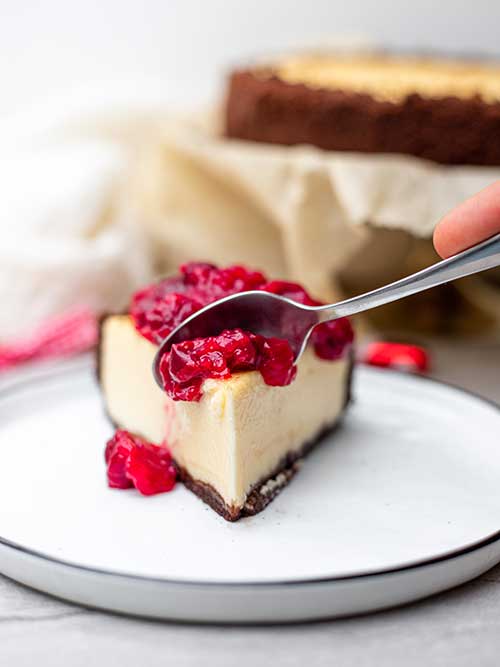
Preparation Method
Cheesecake is best cooked over low and slow heat. The most recommended cooking medium is a water bath.
Also called a Bain Marie, a water bath basically refers to a pan of hot water used to keep the structure and texture of cheesecake in place while the dessert is cooking.
Now that we understand what constitutes cheesecakes, you’re probably wondering if you can share this delicacy with your cat.
But are cats allowed to eat cheesecake?
The following sections will hopefully settle this question.
How Might Cheesecake Harm Your Cat?
1. Cheesecake Is High In Lactose
All dairy products contain decent amounts of lactose, and cheese is no exception. The fact that cheese is a staple ingredient in cheesecake means your cat will most certainly come in contact with lactose if you give him this dessert.
But why is lactose bad for cats?
Cats are known to be lactose intolerant. That’s because they do not possess significant levels of lactase, the enzyme that breaks down the lactose in dairy products. Therefore, exposure to lactose-containing foods can trigger some adverse effects.
Common symptoms of lactose intolerance in cats include;
- Vomiting
- Diarrhea
- Nausea and appetite loss
- Abdominal discomfort
- Gassiness or flatulence
- Digestive upset
It’s important to note that lactose intolerance is more common in adult cats than kittens.
Like dogs and even humans, cats are born with the ability to secrete lactase. But that ability diminishes as they age. That explains why kittens can comfortably eat lactose-containing products like milk and yogurt, while the same cannot be said about older cats.
- High protein cat food dry formula with real chicken as the first ingredient
- Natural with prebiotic fiber nourishes specific intestinal bacteria for digestive health
- Wholesome cat food dry kibble with vitamin A and Omega-6 fatty acids to nourish skin and coat
Last update on 2024-07-21 / Affiliate links / Images from Amazon Product Advertising API
Can kittens eat cheesecake then?
Now that younger cats produce enough of the enzyme lactase and can effectively break down lactose, you could be wondering if you can share some cheesecake with your kittens.
Well, kittens can also enjoy cheesecake the same way as adult cats. But it’s probably not a great idea to share this dessert with them. As you shall find, cheesecake may still contain ingredients that could be harmful to your kitten.
If you must give your kitten cheesecake, it’s best to consider plain cheesecake without any toppings.
2. Cheesecake Is Laden With Fat
Cheesecakes vary significantly in their fat content. However, most cheesecakes still contain worrying levels of fats.
While cats need some fat in their diets for energy metabolism, too much of it poses several health concerns.
Fat-laden foods like cheesecakes are the biggest risk factor for unhealthy weight gain. Giving your cat cheesecake frequently is tantamount to opening him up for chronic diseases like obesity, diabetes, arthritis, and heart disease.
Fatty foods are particularly a problem for cats with preexisting conditions, such as pancreatitis.
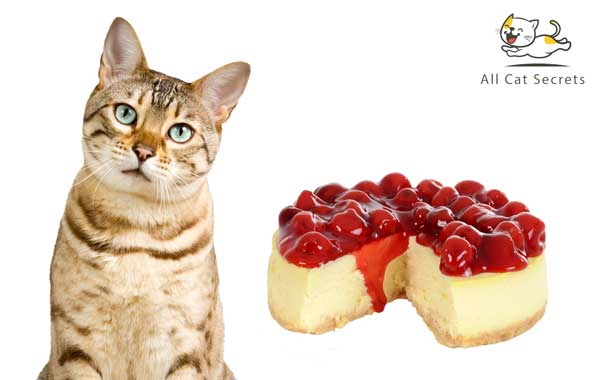
3. Cheesecake Is High In Sugar
Sugar is another basic ingredient in cheesecakes that cats shouldn’t eat. That includes natural sugar and other artificial sweeteners like xylitol.
Note that cats are obligate carnivores. Their diets comprise primarily animal proteins and a small amount of fats.
Like all obligate carnivores, cats do not need sugar in their diets. Sugary foods like cheesecake can trigger digestive distress in cats, leading to nausea and diarrhea.
Besides, cheesecake may trigger blood sugar spikes. Excess sugar in your cat’s blood is a risk factor for diabetes.
And that begs the question, can diabetic cats eat cheesecake?
Cheesecake has a lower glycemic index compared to some sugar-based foods. But that’s not reason enough to share this dessert with your cat. Remember that unlike humans, cats do not require carbs in their diet. A little amount of sugar might be what it takes for your kitto to develop diabetes symptoms. That only makes cheesecake potentially harmful for cats who’re already diabetic.
It’s also worth noting that cats cannot taste sugars as they lack the taste buds for sweetness. So, they’ll not enjoy eating cheesecake the same way humans do.
- CONTAINS: This pack of Delectables Squeeze Ups contains 32 (0.5 ounce eaches) squeezable cat treat tubes.
- INTERACTIVE TREATING: Squeeze Ups provide the purrfect bonding experience between you and your cat – this playful & interactive...
- PUREE TREATS: Each lickable treat tube is stuffed with a thick and creamy puree treat that is made from real poultry and fish.
Last update on 2024-07-21 / Affiliate links / Images from Amazon Product Advertising API
Additives in Cheesecakes and Their Potential Effects on Cats
Most of the basic ingredients in cheesecake – cheese and sugar – are bad enough for cats. But these ingredients aren’t the only reasons to avoid serving this dessert to your feline friend.
Depending on the preparation methods, cheesecake may contain a host of other harmful additives. Let’s review some of the possible effects of those additives on cats by answering a couple of questions;
Can cats eat blueberry cheesecake?
Most berries are harmless to cats. That includes blueberries.
So, you can give your cat blueberry cheesecake provided the dessert doesn’t contain any other harmful ingredients.
Can cats have strawberry cheesecake?
Strawberry is equally harmless (and even potentially beneficial) to cats if served in moderation.
Therefore, cats can eat any strawberry-based dishes like strawberry cheesecake. Just be sure to establish the safety of all the other ingredients in the food.
Can cats eat raspberry cheesecake?
Just like blueberries and strawberries, raspberries are safe and potentially nutritious if given to cats in small amounts.
That consequently makes raspberry cheesecakes safe for your feline friend.
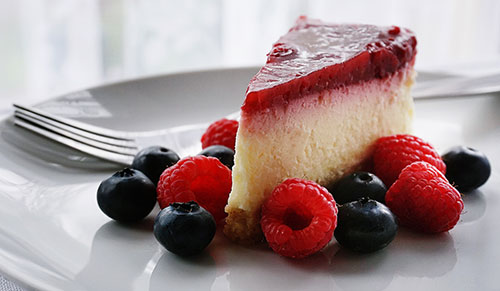
Can cats have pumpkin cheesecake?
Cats may be obligate carnivores. But they can still benefit immensely from diets loaded with plant compounds.
Pumpkin is one of the many plant-based diets that cats can safely eat. Therefore, pumpkin cheesecake is safe for cats too.
Can cats eat chocolate cheesecake?
Chocolate is a common cheesecake sweetener. However, this compound has been shown to cause toxicity in cats and dogs.
Chocolate toxicity in pets results from the stimulants theobromine and caffeine. The consumption of these compounds might cause vomiting, diarrhea, irritability, fever, and elevated heart rate. Without prompt interventions, the symptoms of chocolate toxicity might degenerate into labored breathing, seizures, coma, and even death.
It’s worth noting that cheesecake may contain various forms of chocolate. Examples include chocolate crusts, chocolate drizzle, or cocoa powder. Therefore, it’s important to familiarize yourself with all the ingredients in cheesecake before sharing it with your kitto. That’s especially true for store-bought cheesecake.
Also, chocolate’s color determines its overall toxicity in cats. Darker chocolates are higher in theobromine, hence more toxic than their lighter counterparts.
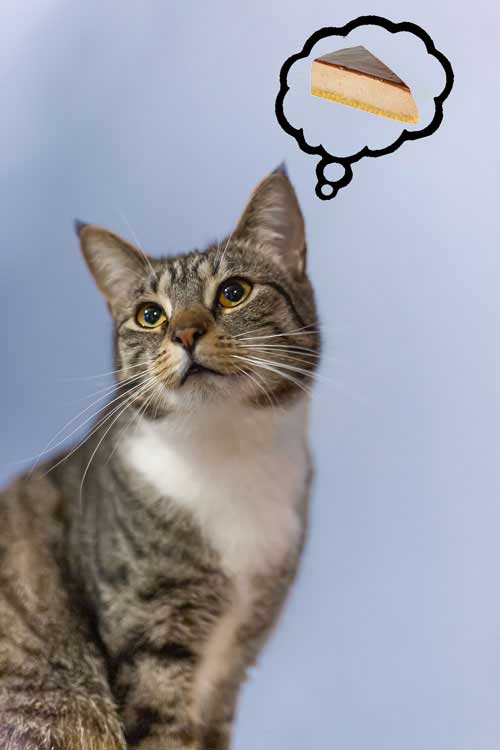
Can cats eat xylitol cheesecake?
Xylitol is a common additive in sugar-free cheesecake. That makes it safer for your cat than sugar and chocolate, right? Wrong.
Xylitol is just as potentially harmful to cats as chocolate and sugar. In fact, some studies indicate it could trigger even worse symptoms, including long-term liver failure. So, cats should avoid xylitol cheesecake at all costs.
Can cats eat vanilla cheesecake?
Vanilla is a powerful flavor enhancer. It’s one of the ingredients that give cheesecake its inviting aroma.
However, vanilla tends to be worryingly high in sugar. And that’s precisely what makes vanilla cheesecakes bad for cats.
Can cats eat lemon cheesecake?
Lemon is loaded with beneficial compounds, including psoralens and the terpenes limonene and linalool.
Unfortunately, these compounds are toxic to cats. So lemon-flavored cheesecake should be out of your cat’s reach.
Can cats eat New York cheesecake?
The main difference between New York cheesecake and regular cheesecake is that the former is usually heavy on cream cheese.
But cream cheese is normally high in fat than regular cheese. Therefore, giving New York cheesecake to your feline friend is a bad idea.
Can cats eat peanut butter cheesecake?
Cats shouldn’t eat peanut butter cheesecake. Peanut butter contains certain ingredients, such as fats and sugar, which might be harmful to cats. Besides, it provides no nutritional value for your kitto.
Can cats eat raisin cheesecake?
Raisins are toxic for cats. A consumption could lead to vomiting, diarrhea, and even kidney failure. So, raisin cheesecake is a no for cats.
Raisin is particularly discouraged for cats with kidney disease. And the fact that it generally comes in powder form makes it even more toxic in smaller amounts.
Can cats eat cherry cheesecake?
Cherries are another cheesecake ingredient that cats shouldn’t eat. Like raisins and grapes, cherries can cause an upset stomach in cats. Cherries might also lead to long-term kidney damage.
Is Cheesecake Bad For Cats?
Cheesecake contains several ingredients that make it potentially harmful to cats. The general rule is to avoid serving this dessert to your cat. But if you must, be sure to establish the safety of all its ingredients. Pay particular attention to the levels of lactose, fat, sugar, chocolate, xylitol, and raisins.
Can Cheesecake Kill A Cat?
The good news about cheesecake is that without harmful additives, the food will unlikely trigger immediate health issues in cats. That explains why feline deaths resulting from ingesting cheesecake are almost unheard of.
However, remember that this dessert might still be loaded with dangerous toxins. For instance, chocolate cheesecakes can trigger severe medical complications in cats due to the presence of theobromine. And without timely interventions, your cat may die from the ensuing symptoms of chocolate poisoning.
- Cats Lose Their Cool: Temptations Creamy Puree Wet Cat Treats deliver irresistible tuna flavor in a squeezable, creamy puree your...
- Versatile Feeding Experience: Feed this lickable wet cat treat by hand for an interactive bonding experience, treat on its own in...
- Fewer Than 15 Calories Per Pouch: Feel good treating your cat because each pouch contains fewer than 15 calories.
Last update on 2024-07-21 / Affiliate links / Images from Amazon Product Advertising API
Can Cats Eat Plain Cheesecake?
Cheesecake isn’t inherently harmful to cats. The toxicity of this food depends on the added ingredients.
Therefore, if you must share cheesecake with your feline housemate, insist on the plain varieties. And the good news is that there are numerous cheesecake for cats recipes that you can explore, including the recipe on this YouTube video.
Not only is plain cheesecake safer for cats. The food might also benefit your kitto in some way.
Most of the health and nutritional benefits of plain cheesecake come from the eggs in this dessert.
Egg is rich in nearly all the essential vitamins, including vitamin A, B2, B5, B6, B12, D, E, and K. Each of these vitamins performs several crucial functions in a cat’s body.
Eggs are also loaded with powerful antioxidants, including lutein, zeaxanthin, and selenium. Lutein and zeaxanthin have been widely studied for their role in improving eye vision and reducing the risks of macular degeneration.
These compounds may also rejuvenate your cat’s coat and fur. On the other hand, selenium boasts powerful anti-inflammatory properties. Supplementing with this mineral might help minimize the risks of inflammatory conditions like cancer and feline osteoarthritis.
Needless to mention, eggs are also a rich source of animal protein. In fact, organically-produced eggs contain a healthy balance of all the essential amino acids, including taurine.
Cats require a significant amount of taurine in their diets. This amino acid supports the normal functioning of vital organs, including the heart, brain, liver, and central nervous system. Taurine also supports healthy metabolism. Therefore, taurine-rich diets like plain cheesecake may cushion your cat from metabolic disorders.
Other notable minerals in eggs that cats might benefit from include calcium, zinc, folate and phosphorus.
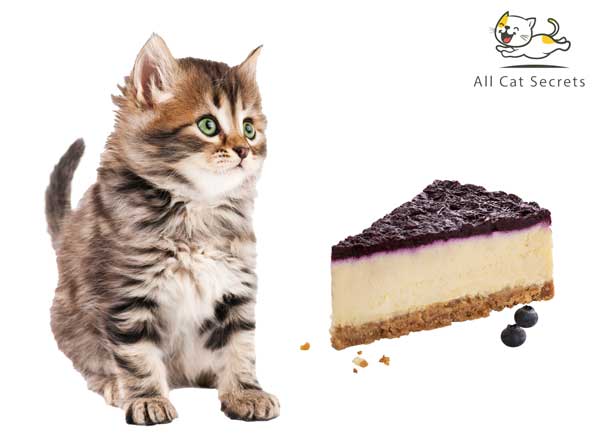
Is Cheesecake Ok For Cats?
Cheesecake is generally discouraged for cats because of the ingredients in it.
But as we’ve just seen, plain cheesecake isn’t inherently harmful to cats. In fact, the eggs in plain cheesecake may even benefit your kitto.
So, whether cheesecake is okay or toxic to cats mainly comes down to its composition.
Do Cats Like Cheesecake?
Cats generally love the taste of cream. The fact that cheesecake generally contains decent amounts of cream explains why your cat might be attracted to it.
However, can cats eat cheesecake with ice cream?
Despite cats’ affinity for cream, giving cheesecake with ice cream to your cat is a bad idea. That’s because ice cream is usually laden with fat, sugars, and (depending on its source) lactose. All these ingredients are harmful to cats.
In the same breath, it’s important to know what happens if a cat eats cream cheese. The symptoms will largely depend on the specific ingredients your cat has been most exposed to. But you can expect bouts of vomiting and diarrhea, especially if the cat consumed too much of the cream cheese.
Other Frequently Asked Questions Relating to Cats and Cheesecakes
Can cats eat cheesecake crust?
Cheesecake crust is probably not good for cats due to its toughness, which could pose choking risks.
Can pregnant cats eat cheesecake?
Cheesecake contains several minerals and vitamins that may benefit pregnant and even nursing cats. Just be sure to serve it in moderation.
- Works as a dog food topper - For pet parents looking for an alternative to capsules, raw treats, or soft chews, all it takes is a...
- A tasty & body nourishing treat for cats & dogs - Essential fatty acids for a healthy coat.
- Powerful Omega Fatty Acids - This premium fish oil liquid formula is loaded with the healthy Omega-3 fatty acid (with epa and dha)...
Last update on 2024-07-20 / Affiliate links / Images from Amazon Product Advertising API
How much cheesecake can my cat eat?
The amount of cheesecake your cat can eat depends on factors like his age, body weight, and activity levels. You generally want to avoid giving your cat cheesecake. But if you must, keep the portions low.
What if my cat ate a small amount of cheesecake, will he be okay?
Yes, cheesecake may not cause severe reactions in your cat if only consumed in small amounts. But this is only true for plain cheesecake
My cat ate cheesecake – what do I do?
The best thing to do if you suspect that your cat has consumed significant amounts of cheesecake is to take him to the vet.
So, Can Cats Have Cheesecake?
Cats can only eat plain cheesecake and they should only do so in moderation. Despite containing no known toxins, excess consumption of cheesecake can make your cat sick.
If possible, consider safer cheesecake alternatives for cats, such as spinach, cauliflower, and pumpkins. Better yet, stick to your cat’s regular food of animal-derived protein.
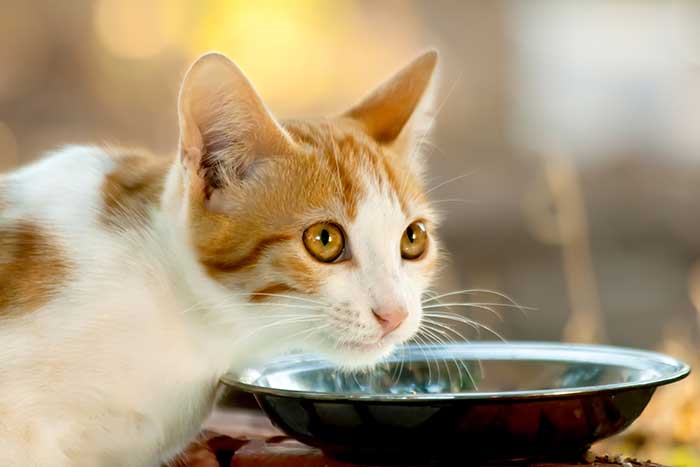
Checkout Our Favorite Cat Products
1. Best Online Course For Cat Parents
Our favorite: The Cat Language Bible (How to Finally Understand And Speak to Your Cat) – A new form of cat to human communication that many cat owners have dreamed about… but few have actually thought possible.
2. Best Immune Support For Cats
Our favorite: Tomlyn Immune Support – Best Supplement for Cats and Kittens.
3. Best Cat Treats
Our favorites: LIFE ESSENTIALS All Natural Freeze Dried Chicken And Sheba Meaty Tender Sticks – Both are Great.

